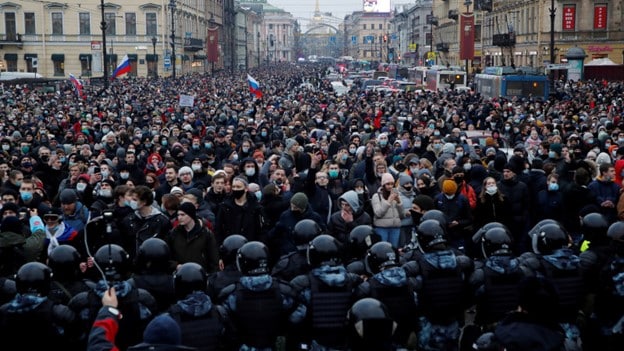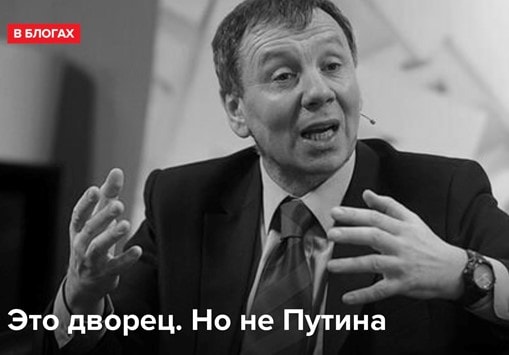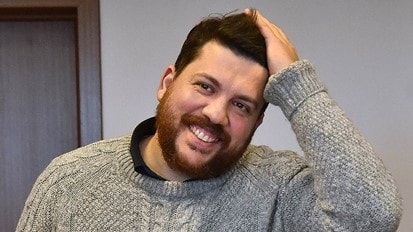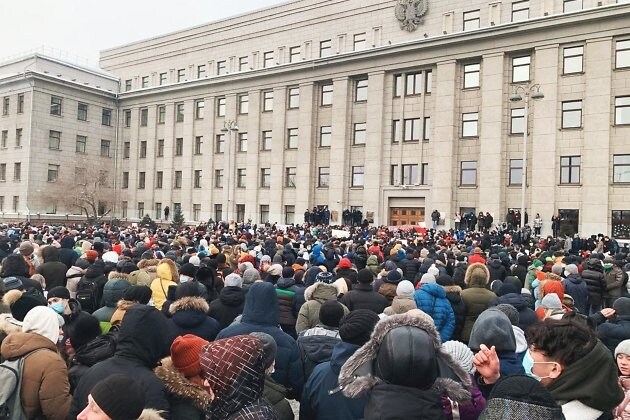Introduction
Alexey Navalny, the opposition leader and anti-corruption fighter returned to Russia on January 17, 2021 from Germany, where he had recovered from the near fatal attempt to poison him. He was immediately arrested at Moscow's Sheremetyevo airport to which his plane had been diverted in order to discourage press coverage of his return and arrest. His arraignment took place in a police station rather than in a regular court and there were other irregularities in the proceedings.[1] Navalny and his supporters had two counterstrokes. Navalny's anti-corruption foundation posted on YouTube an expose of Putin's billion-dollar Black Sea palace complete with an $800 toilet brush and a $1250 toilet paper holder. [2] They also staged nationwide protest demonstrations on January 23, 2021.
Pro-regime spokespersons and surrogates attempted to denigrate Navalny and dismiss the demonstrations as miniscule and over-reliant upon impressionable minors, who additionally served as human shields to deter an effective police response to the demonstrators. Regime opponents as well as some neutral observers believed that the demonstrations were sizable and dominated by adults. Moreover, the demonstrations brought out people, who had hitherto remained on the sidelines and in a rarity for the Putin era brought together people from Moscow and St. Petersburg as well as Russians from the periphery.
Below is MEMRI's review of the events surrounding Navalny's arrest.

Pro-Navalny demonstration in St. Petersburg (Source: Tengrinews.kz)
Prior to Navalny's return, there was speculation about how the regime would handle Navalny's return.
Kommersant's Drize: 'To Put Navalny Behind Bars Would Be A Big Mistake'
Kommersant columnist Dmitry Drize believed prior to the arrest that the regime would be ill advised to take Navalny's bait and arrest him upon his return from Germany. He wrote:
"...And Navalny’s decision to return appears quite natural: If you position yourself as a leader, then you must accept the challenge.
"The most interesting thing is that in his own way the politician [Navalny] is in an advantageous position.
"Let the authorities have a headache over what to do with him, the status of political prisoner number one is worth a great deal. This is global recognition. Even in prison one can put on a show that, as the saying goes, will not be pretty [for the authorities].
"Therefore, it seems to me that putting Navalny behind bars would be a big mistake. But be that as it may, things are popping in Russia, political life awakens and 'hibernation' is ending. Moreover, it is altogether possible that Alexey Anatolyevich [Navalny] will not return empty-handed, but with new interesting investigations or compromising evidence. So, the authorities will have to react to this as well.[3]
Political scientist Alexey Makarkin believed that this was a Greek tragedy situation, where both sides had lost their freedom of action
"The authorities made their move, they warned him [Navalny]. Most likely, this warning will be implemented. And Navalny understands this. The conflict has reached the point of no return, Navalny is no longer perceived by the authorities as an opponent, but as an enemy." Makarkin believed, that "the main reason for Navalny's return was the understanding that the [opposition] political machine must be managed in person."
"He [Navalny] has chosen risk, clash and struggle. Let only 15% [of the population] declare support for him now. He is counting on the erosion and undermining of the political regime, this is a long-term game. I believe (although I would not like it) that he is counting on a big trial."[4]
Ria Novosti's staunchly conservative columnist believed that Navalny had to return because he was not an independent actor but a subservient tool of Western intelligence agencies who needed a martyr and a possible agent in place in case of political turmoil. But precisely because Akopov views Navalny as a Western hireling, it was important not to fall into their trap by arresting Navalny.
"There is no point in promoting the 'Navalny in emigration' brand to the level of the [exiled Belarus opposition leader Svetlana] 'Tikhanovskaya' brand, because the plans of even the loudest Western Russophobes do not include either a complete cessation of relations with Russia or a transition to open confrontation at all fronts.
"[The Western media] can tell the readers of European newspapers stories about Navalny’s mass support, but to present him as the “future leader of Russia” is too much of a stretch.
"The 'leader of the opposition in exile', the digital age notwithstanding, is completely inconducive to the task of influencing the situation in Russia. The West already has the useless [Mikhail] Khodorkovsky, [Gary] Kasparov and a dozen other lesser-known candidates in emigration.
"Yes, Navalny would not have lost the bulk of his supporters in Russia, but the Western comrades need him to play the role of 'the fellow, persecuted by Putin”. And how can Putin 'persecute' him in Germany? – to use the 'Novichok' agent again? Well, even the Germans will not buy that.
"When the "transfer of power" begins at the top echelons of Russia (after all, Russian analysts write about it all the time on Telegram!), a window of opportunity will open and turbulence [commotion] will be created. It is then 'project Navalny' will work, it might not create a 'people's revolution' or take power, but at least it will influence the future configuration (and direction of Russia’s policy, which is the main thing).”
The Western "partners" would be quite happy with such a scenario, but it is almost impossible for their "project". The poisoning of Navalny raised the stakes among fans of the 'project' both in the West and in Russia. Thus, everyone is now waiting for either a new assassination attempt, or for Navalny’s imprisonment ...
And the Russian Federal Penitentiary Service (FSIN) seems to be playing along with the expectations, by stating that it "is obliged to use any means in order to arrest the criminal – Navalny", who has been on the wanted list since the end of December due to violations of the probationary period conditions. So, theoretically, a suspended sentence for Navalny could be changed into a real one. But in reality, no one will put him in prison..."[5]:
Yulia Kalinina: Navalny Had A Comprehensive Plan, The Regime Was Caught Flatfooted
As aforesaid, Navalny's supporters responded with the palace video and the call for demonstrations and the regime appeared to be unprepared. The veteran journalist Yulia Kalinina writing in Mk.ru believed that Navalny had constructed a comprehensive plan to confound the authorities and it was working.
"Comrades, some of you, apparently, were actually surprised when Navalny was taken from Sheremetyevo [airport] to jail. But I assure you: there was no surprise for [Navalny] himself. The Federal Penitentiary service warned in advance that he would be detained. They could not help but to detain him.
"Your knight [in chess] cannot do that. And Navalny, of course, knew this full well. He flew to Russia not to return home. The flight to Moscow was just the first step of his new comprehensive plan. A comprehensive plan has been calculated by people who know perfectly well how our state system works and predict its responses with 100% accuracy.
"Navalny flew in - he made the first move of the plan. They jailed him pre-trial for 30 days - this was the calculated and expected response by the system.
"We saw the second move a day later: a movie about Putin's palace filmed in advance by Navalny. The main goal of the film is to provoke the system to the extreme. The system has no response to the film yet, it misses a turn.
"Navalny is already behind bars. You can't even poison him now. And Navalny's team immediately makes the third move of the comprehensive plan: calls are spreading on the Internet to go to a rally. The dissemination is not done haphazardly, but precisely targeting youth and teenage social networks. I don’t know how this is done. But, judging by what is happening now among the youth, such technologies exist.
"If you have children over 13-14 years old on hand, ask what the Russian-speaking TikTok is breathing today. Navalny and a rally - that's what it breathes. Although, it would seem, where are the Tiktokians and where are the politics, right?
"It is already clear that the rallies will be for children. But the system will treat them like adults, as also calculated by the developers of the comprehensive plan. Children will be blamed and drenched [by water hoses]. All the fury caused by the palace movie will descend on them.
"The adult population shocked by the abuse of children by riot police should take the next step in the Comprehensive Plan. It must be aroused and sing its song. Children will act as the opening act. All this is very sad, in my opinion. Therefore, I don’t want to guess what other steps are envisaged by the Comprehensive Plan."[6]
Yulia Kalinina (Source: Mk.ru)
The Kremlin did deny that the palace in the film belonged to Putin and this was a "pseudo-investigation".[7] Putin speaking before students was asked about the palace and denied that it belonged to him or any of his relatives.[8] However, the denials followed an attempt to rebut the accusations by painting them as yet another attempt by Western intelligence services to foment insurrection in Russia as they had done in Ukraine's Maidan protests that toppled a pro-Russian government. Political scientist Sergey Markov, who frequently defends regime policies in the media exemplified this form of rebuttal:
"So why did Navalny, or rather the NATO special services, which operate under the nickname 'Navalny', create this rotten news about the palace now? There are two reasons for it:
"A new phase of the battle against Russia and of the preparation of the Russian Maidan began. It is a personal attack against Putin. It began in September 2020 with an idiotic, insane, shamelessly false accusation that Putin personally gave an order to poison Navalny with military weapons of mass destruction before he boarded the plane. And it continues now. And there will be more [attacks]. The attack was organized by the same structures that successfully overthrew [Ukrainian President Viktor] Yanukovych. They remember well how the fake about Yanukovych’s golden toilet helped them dethrone him.
Thus they [NATO] decided to use the same trick about 'Yanukovych's golden toilet' in the form of 'Putin's Palace'. They [NATO] perceive you [the readers] to be naive fools who are ready to believe in this 'golden toilet of Yanukovych' in Gelendzhik [the city in, whose vicinity Putin’s alleged palace is situated]. By the way, this golden toilet was never found - it turned out to be a lie.
"A personal attack on Putin is a form of personal defense for Navalny. Now, any attempt to harshen Navalny’s punishment will be actively promoted as Putin’s personal revenge against the oppositionist for exposure of his 'palace in Gelendzhik.'
"So what should we do? We need to firmly understand, constantly say and write, that we know that all the attacks by the NATO special services and their agent Navalny on Putin are a lie, which is designed to destroy Russia and make the residents of our country impoverished, as they were in the 1990s [before Putin came to power]."[9]

Sergey Markov. The caption reads: This is a palace but it is not Putin's (Source. Kaffanews.com)
Were The Demonstrations A Children's Crusade?
Pro-Putin outlets tried to diminish and condemn the demonstrations with the claim that the organizers were enticing minors to attend both to swell the demonstrators' ranks and to serve as a human shield. Russia's Ministry of Education instructed parents to keep an eye on their children on the day of the demonstrations. [10] The children's ombudswoman Alevtina Andreyeva warned "It is import to understand that the childish curiosity and the possible desire to attract attention to one self and join friends and the group can attract irreversible consequences for the child."[11]
After the demonstrations, regime defenders persisted with the accusation that the demonstrators were exploiting minors. Even Vladimir Putin joined in: "Least of all should underage children be pushed to the front...this is what terrorists do" when they "drive women and children ahead of them...The focus slightly shifted here, but essentially it is the same."[12]
Nikita Danyuk, the first deputy director of the People's Friendship University Institute for Strategic Research and Forecasts, and a member of the Russian Federation's Public Chamber, believes that the organizers aimed to bring to the streets as many minors as possible. “This technique has been tested and it is quite effective, although, as a political calculation, it is absolutely disgusting and cynical.”.
Danyuk accused the organizers of exploiting young people as a human shield, "so one can hide from the representatives of law enforcement agencies and carry out a large number of provocations." The organizers hoped the police would act brutally against the young participants at the rally thus alienating Russia's "silent majority". The law enforcement bodies avoided the trap by acting with restraint. [13]
Gennady Zyugavov, who heads the Communist Party claims that Navalny (whom he likens to Father Gapon, who headed a trade union controlled by the Tsarist secret police) was reminiscent of Adolph Hitler: "When I look at the calls of those who are trying to drag in the youngsters in order to set fire to our country, I recall the following scene: Hitler walks by the youngsters, slaps them encouragingly on the cheeks and distributes faust [anti-tank] cartridges. Now similar people walk by, including under the flag of patriotism, patting children on the cheeks in order to drag another Gapon to the throne."[14]
This view was challenged by Putin opponents and neutral observers. Political scientist Kirill Rogov wrote: "Contrary to expectations, there was no significant involvement of the youth in the protest. A group of sociologists, which monitored the protest estimates the share of school children at about 5%, maximum 10%."[15]
Kirill Martynov, a columnist for the liberal Novaya GazetaT agreed: "There were few minors at the rallies, and they certainly did not make up the majority. Which, of course, will not prevent the propaganda in the coming days from releasing stories about how the opposition allegedly deliberately exposes children to mortal danger by putting them under the policy batons (as if it was Navalny's supporters, and not the security forces, who were the source of violence here). Propaganda, perhaps, will really convince and intimidate someone, but we will notice something else: rallies are no longer conducted by those familiar leaders of the democratic opposition who led people in the 2000s and 2010s.[16]
The Numbers Game
As with most political demonstrations nowadays the estimate of the demonstrators varied with political sympathies. Pro-regime surrogates disparaged the turnout, while the organizers spoke of a much higher total number of demonstrators.
Andrey Manoilo, a member of the Scientific Council advising the Russian Federation's Security Council, claimed that in Moscow the turnout was small: "In terms of number, fewer people came than in previous years, even less than in 2019". This could be explained by the reluctance of people to go "to work for Navalny, who is thus building his scandalous career...The percentage of Navalny's core supporters is small. There are a lot of random people who just came to take a look. More and more people understand that they are obviously being used, by those trying to involve them in protests against the government." Manoilo praised the police who distributed masks and hot tea to the demonstrators and did not succumb to provocations. "The tactics are quite correct. If you respond with aggression to aggression, then this will generate an even greater aggression. And when the police say that their task is to ensure the safety of the protesters, it breaks the stereotyped scheme. "
While the regime had easily weathered the demonstrations, this was no reason to relax vigilance because mobilization through social networks is "a very effective and dangerous thing." However, as far as Navalny was concerned there was no reason for alarm. The low turnout was attributable to the fact "that people did not want to stand up for Navalny, because he is a scandalous and very narcissistic character. The way Navalny quarreled with all the non-systemic opposition, could only be done by an agent of the Okhrana, [Tsarist secret police]." [17]
This view of turnout was of course challenged by organizers and attendees at the demonstrations. Leonid Volkov, a close associate of Navalny, was ecstatic: "I believe that the previous all-Russian rallies were an act of true heroism and a victory of civil society, no matter how worn-out these words may seem. We really saw an absolutely unprecedented number of participants and an absolutely unprecedented geography, both in Russia and abroad. According to our estimates, in Russia, in total, 250-300 thousand people participated in the rallies held in 120 cities. This has never happened before. The situation in 2011 was completely different."[18]

Leonid Volkov (Source: Kommersant.ru)
Sergey Romanchuk, Head of Foreign Exchange and Money Market Operations at "Metallinvestbank", President of ACI Russia [The Financial Markets Association] attended the Moscow demonstration and came away with the impression that demonstrations had become mainstream: "It feels like one of the most massive protest actions in recent years. I believe there will be more rallies, because the cause for the rally can be nullified, but the reason for the dissatisfaction of the population won't get anywhere. In the big cities, and in Moscow in particular, dissatisfaction with the authorities is no longer a marginal position, it is becoming mainstream. It is difficult to find a city resident, who believes that putting political opponents in prison is the norm."[19]
Dmitry Alekseev co-owner of DNS trading, who attended the Vladivostok demo remarked on the disparity between what he personally witnessed and what was reported by the official media: "There were many people. For the Vladivostok norm, a lot of people came. But it is difficult to accurately assess the number. The rally was held over several points, plus protesters moved through the city. But when media report about 500 people, this is complete nonsense."[20]
Moscow And The Regions Demonstrated In Unison
The organizers and their supporters were cheered by the fact that demonstrations were staged throughout Russia and not just in comparatively liberal Moscow and St. Petersburg. Novaya Gazeta's Martynov observed: "When Moscow is troubled, the regions usually remain indifferent, and vice versa - but not now.
"People took to the streets not only for the freedom of Alexei Navalny, but also because they see no other way to seek justice where there is no court or elections. On January 23, “another united Russia” was on the streets: a movement in which Muscovites and residents of regional centers finally found common interests - the rule of law, personal security for everyone, and an end to corruption..."[21]
Kiril Rogov believes that based on the turnout, the regions may have snatched the leadership of the protest movement from Moscow:
"Another indicator that has become important is geography. About 100 thousand people came out to the rally in December 2011 in Moscow, and about the same number of people took to the streets throughout the country. Back then Moscow accounted for about half of the total number of protesters.
However, now we see that Moscow had only about a quarter of total number of protesters. And such a situation is new to us. One might get an impression that regions [in terms of protest activity] progressed significantly, which cannot be said about Moscow.[22]


Demonstration in the Siberian city of Irkutsk (Source: Ircity.ru)
Were The Demonstrations A Game Changer?
Russian experts were not certain whether the demonstrations had established Navalny as the leader of the opposition. Rosbalt's observer Alexander Zhelenin believes that the attempt to discredit Navalny that the pro-system opposition parties joined readily served to discredit them and now there was a "party of Putin" versus a "party of Navalny". He wrote:
"Furious attacks by the Duma factions’ leaders on Alexei Navalny, who was arrested the day before, confirm the frequently stated idea, that there are no ruling and opposition parties in the lower house of the Russian parliament but merely different factions of one large party in power.
"As happened back in August 2008 and in 2014, minor inter-factional disagreements are instantly pushed aside, and deputies immediately act as a single bloc as soon as they feel the slightest threat of losing their position (and consequently losing the privileges, which their position provides).
"The thing is that, by desperately consolidating its ranks against Navalny, the ruling class (no matter consciously or unconsciously) splits all relatively active Russian citizens into two irreconcilable camps: the 'party of Putin' and the 'party of Navalny'.
"Moreover, the Putin 'camp' assembles mostly armchair career politicians, who are by definition cowards, conformists and opportunists; while the Navalny 'camp' gathers those, who regardless of differences in political views, believe that 'it is impossible to live like this anymore'.[23]
Political scientist Alexander Kynev does not believe that Navalny has cemented his leadership over the protest movement. "The most important thing in today’s rally is the widest possible geography of protest. The protests took place where they never happened before. Many cities witnessed the most massive street rallies in the past 30 years.
What is more important, the rallies were spontaneous: there was no clear organization or planning of rally routes. It means that people took to the street on their own accord. This is an obvious result of the displeasure accumulated in society. Moreover, most joined the rallies not because of Alexei Navalny, but against the authorities' deafness and impudence the authorities. In this sense, the actions in many cities resembled the protests in Khabarovsk.[24]
Political consultant Gleb Pavlovsky takes an intermediate approach: “From the point of view of the action's organizers, this constitutes a success, although, perhaps, not as big as they expected. [The demonstrations] attracted 20% - 30% new members, who have not taken to the streets before - this is a great success. On the other hand, the number of participants is not as large as they expected, however, in all regional centers we see a consolidated stable network of several hundred participants ready to go out and demonstrate... this is a stable protest network that is not tied to Navalny's system of headquarters, but at the same time is ready to interact with them and trust them. What does this mean for Navalny? This will increase his safety, because he can no longer quietly disappear as a forgotten opposition politician. And at the same time, he confirms that, even after being convicted, he will retain control of this protest network.[25]
*Amiel Ungar is an analyst and the editor of the Russian Media Project at MEMRI; Anatoly Strandberg is a MEMRI research fellow.
[1] Rbc.ru, January 19, 2021.
[2] Cnn.com, January 20. 2021.
[3] Kommersant, January 13.2021
[4] Rosbalt.ru, January 13, 2021.
[5] Ria.ru, January 16, 2020.
[6] Mk.ru, January 21, 2020.
[7] Kommersant, January 24, 2020.
[8] Rbc.ru, January 25, 2020.
[9] Echo.msk.ru, January 20, 2021.
[10] Rbc.ru, January 22, 2021
[11] Severpost.ru, January 22, 2021.
[12] Tass.com, January 25, 2021.
[13] Vz.ru, January 23, 2021
[14] Vesti.ru, January 23, 2020.
[15] Thebell.io, January 24, 2021.
[16] Novayagazeta.ru, July 23, 2021.
[17] Vz.ru, January 23, 2021.
[18] Thebell.io, January 24, 2021.
[19] Thebell.io, January 24, 2021.
[20] Thebell.io, January 24, 2021.
[21] Novayagazeta.ru, January 23, 2021.
[22] Thebell.io, January 24, 2021.
[23] Rosbalt.ru, January 21, 2021.
[24] Thebell.io, January 24, 2021. On Khabarovsk see MEMRI Special Dispatch No. 8850, Russian Commentators Try To Explain Why Khabarovsk Residents Massively Rallied In Support Of Their Governor Sergei Furgal Following His Arrest On Murder Charges, July 20. 2020.
[25] Kommersant.ru, January 24, 2021.




